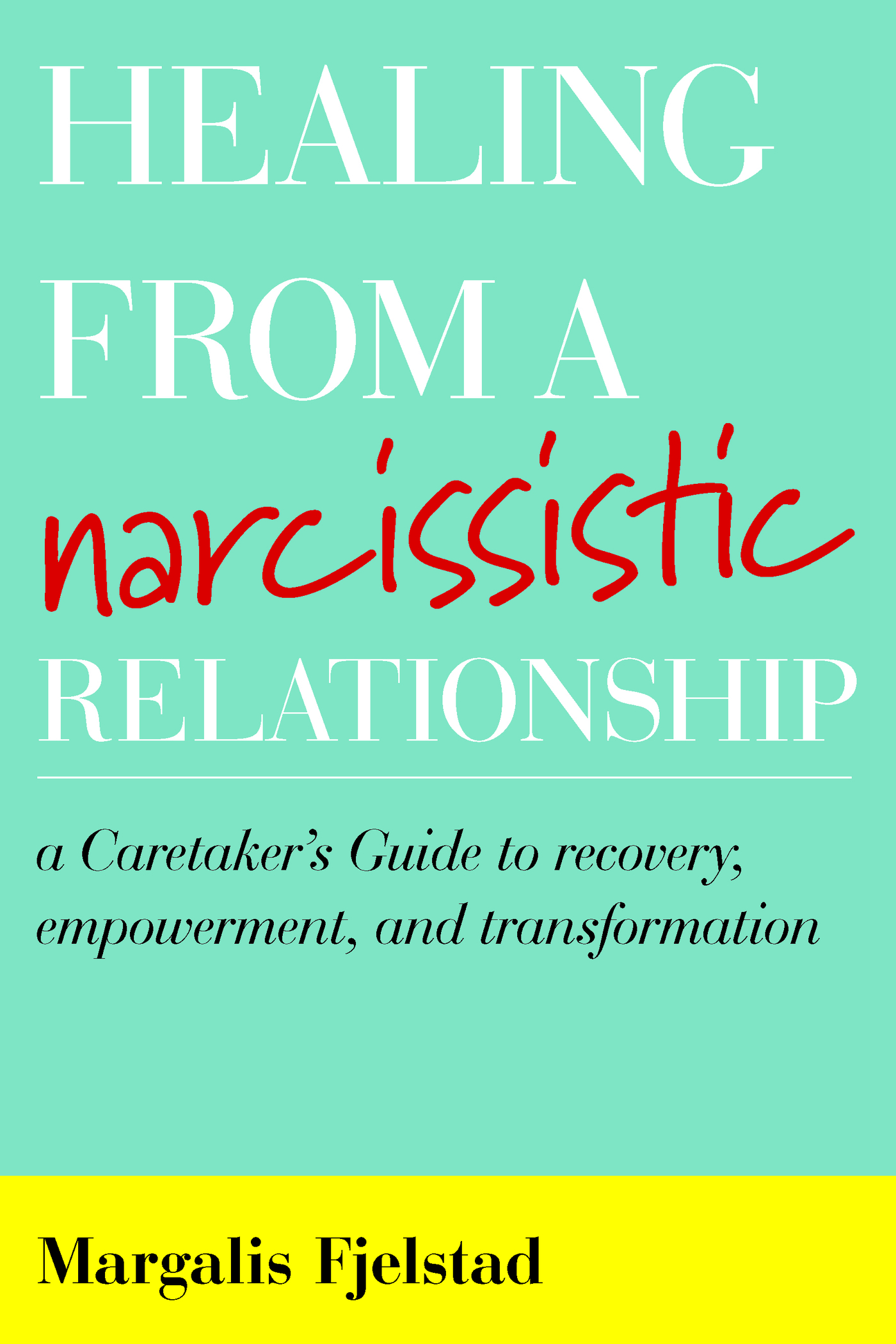Healing from
a Narcissistic Relationship
Healing from
a Narcissistic Relationship
A Caretakers Guide to Recovery,
Empowerment, and Transformation
Margalis Fjelstad
ROWMAN & LITTLEFIELD
Lanham Boulder New York London
Published by Rowman & Littlefield
A wholly owned subsidiary of The Rowman & Littlefield Publishing Group, Inc.
4501 Forbes Boulevard, Suite 200, Lanham, Maryland 20706
www.rowman.com
Unit A, Whitacre Mews, 26-34 Stannary Street, London SE11 4AB
Copyright 2017 by Rowman & Littlefield Publishers
All rights reserved. No part of this book may be reproduced in any form or by any electronic or mechanical means, including information storage and retrieval systems, without written permission from the publisher, except by a reviewer who may quote passages in a review.
British Library Cataloguing in Publication Information Available
Library of Congress Cataloging-in-Publication Data Available
ISBN: 978-1-4422-7200-2 (cloth : alk. paper)
ISBN: 978-1-4422-7201-9 (electronic)
 TM The paper used in this publication meets the minimum requirements of American National Standard for Information SciencesPermanence of Paper for Printed Library Materials, ANSI/NISO Z39.48-1992.
TM The paper used in this publication meets the minimum requirements of American National Standard for Information SciencesPermanence of Paper for Printed Library Materials, ANSI/NISO Z39.48-1992.
Printed in the United States of America
We must be willing to let go of the life we planned
so as to have the life that is waiting for us.
E. M. Forester
AUTHORS NOTE
The examples, anecdotes, and characters in this book are drawn from my clinical work, research, and life experiences with real people and events. Names and some identifying events and details have been changed, and some situations are composites to protect peoples privacy.
Throughout the book I consistently use masculine pronouns when talking about the narcissist. This is for ease of writing, instead of he or she, and because it is estimated that approximately 70 percent of narcissists are male. If the narcissist in your life is female, all of the comments and suggestions here will also apply.
Introduction
Relationships with narcissists can be painful, frustrating, complicated, and totally mystifying. Nothing they say or do seems to be the same from day to day. They can be charming and loving one moment and hateful and demeaning the next. They tell you one thing and then do another. When you confront them with these discrepancies, they blame you and say youre the crazy one, and often you do end up feeling like youre crazy. The narcissist can swing you from emotional highs to emotional lows. Most relationships with narcissists can be described as follows in the next few paragraphs.
The relationship started out almost as a fairy tale. In the beginning you felt adored, understood, ecstatic, and more smitten than you had ever felt before. You thought that the two of you were completely in tune and that you even shared the same thoughts, feelings, and dreams. Your partner described to you the perfect life you would share together, more wonderful than you would have dared to dream of on your own. You felt a oneness. The relationship progressed very quickly, and within days, you were deeply and irrevocably in love. The narcissist told you this was the perfect relationship, and you committed yourself entirely.
But something changed after thatit may have been almost instantly or may have taken a few months or longer. Your oneness didnt seem to be there anymore. Your loved one became controlling, selfish, angry, blaming, and self-justifying. You no longer felt understood, and your needs seemed to be discounted and even mocked. You began to feel unheard, unappreciated, frustrated, and often depressed and anxious. You had to work hard to ignore your feelings of hurt and rejection.
You tried to talk about your feelings and needs, only to be treated as if your requests were silly, unimportant, or just plain foolish. You ended up wondering what was wrong with you. What had you done to make your loved one so distant and indifferent? You kept trying. You made accommodations. You gave more love and attention. You gave in to keep the peace. You gave up your interests and even time with your friends and family to meet your loved ones expectations. You tried in every way to be the perfect spouse or partner. And you kept hoping to get that loving feeling to return.
It was so confusing. You started to feel as though your whole life was being controlled by this person. Why was your partner being so mean and self-centered? You wanted your needs to be considered. You wanted to feel cared about. You wanted the relationship to be more equal and shared. You tried to do everything perfectly, and when that didnt work, you tried harder. Nothing seemed to make a difference for very long. You continually felt like the giver, your partner always demanding and taking more. And you often felt guilty that you werent doing enough and couldnt get it right.
The longer youre in a relationship with someone so self-centered and self-absorbed, the more you feel drained, disappointed, and hurt. His selfishness pushes you away, but something inside of you keeps hoping things will change and hell again be the person you know he can bethe funny, smart, caring person you first met but who now seems to be buried most of the time.
Along the way you saw hopeful signs. Your partner would suddenly be just as sweet and loving and attentive as you remembered. You felt that surge of happiness and relief that things were going to be all right after all. But all too quickly he switched back into anger and blame, ignoring and criticizing you when everything didnt go perfectly. Through all of this you kept hoping things would work out, and you kept working hard to be loving and kind to prove how much you wanted to make the relationship succeed.
Then one day your loved one announces that the relationship just is not working. Its no longer fulfilling or exciting. Youre too negative and needy. Youre boring and uninteresting. What? You are shocked and wonder if hes kidding you. You tried all this time to be as perfect, loving, accommodating, and giving as humanly possible, and that wasnt enough? You discounted your own needs and wants to make the relationship work, and even that wasnt sufficient. You denied your own feelings of dissatisfaction and kept trying to be positive and optimistic. Now, he says its your fault. You didnt give enough, or you complained too much, or you werent interesting enough, or sexy enough, or whatever enough. Youve just been dumped by a narcissist.
Over my thirty-plus years of working as a marriage and family therapist, I have witnessed many such scenarios. And I, too, was once dumped by a narcissist. The experience is mind-numbing and devastating. Over the years it has been my purpose to comfort and heal the family members who are negatively affected by a loved one with narcissistic personality disorder.
So many people, including therapists, try to figure out why narcissists do what they do, and there are hundreds of books on that subject. I wrote my first book, Stop Caretaking the Borderline or Narcissist, because there was little written for people who found themselves enmeshed in a relationship with a narcissist or borderline person. I wanted family members to know that they were being seen and heard. I wanted to tell them there are defined patterns of thinking and feeling that create these insane dramas that they get drawn into. I wanted to show them they could get out of the drama. I also wanted them to know they could not fix or cure their narcissistic family member but that they could stop buying into the narcissists insanity and learn to make a better life for themselves.
Next page
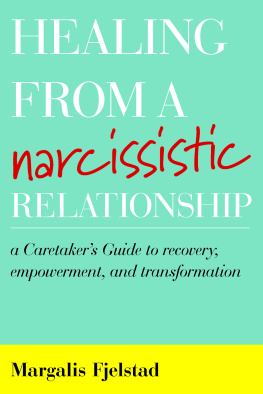

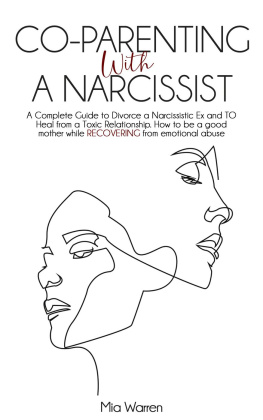

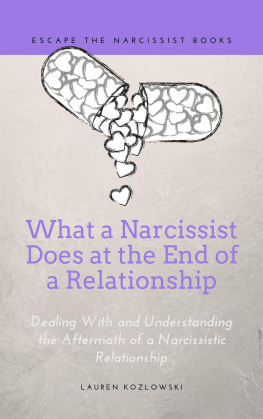

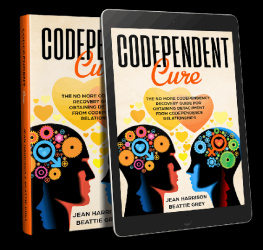
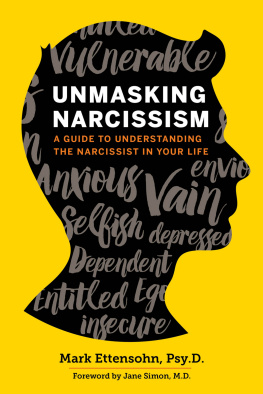
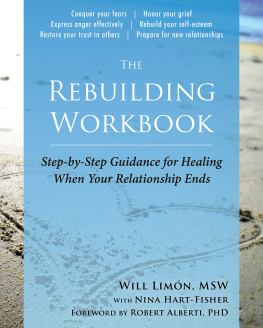
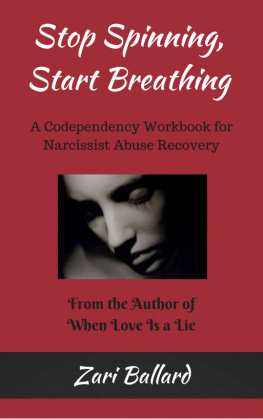

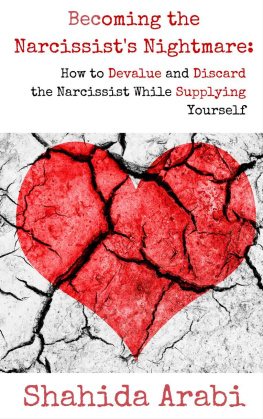
 TM The paper used in this publication meets the minimum requirements of American National Standard for Information SciencesPermanence of Paper for Printed Library Materials, ANSI/NISO Z39.48-1992.
TM The paper used in this publication meets the minimum requirements of American National Standard for Information SciencesPermanence of Paper for Printed Library Materials, ANSI/NISO Z39.48-1992.